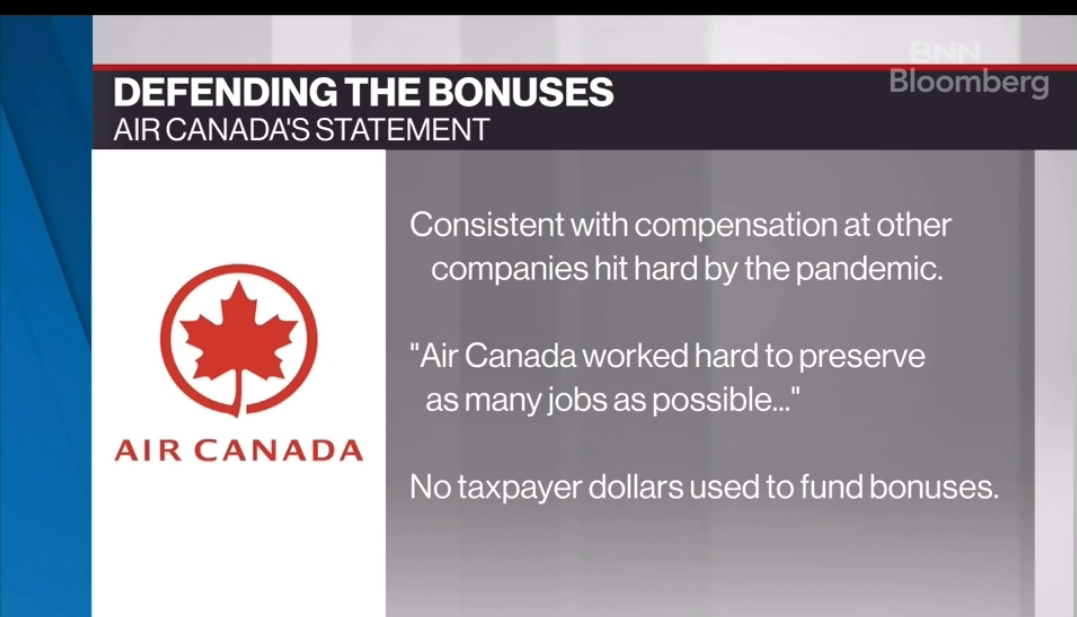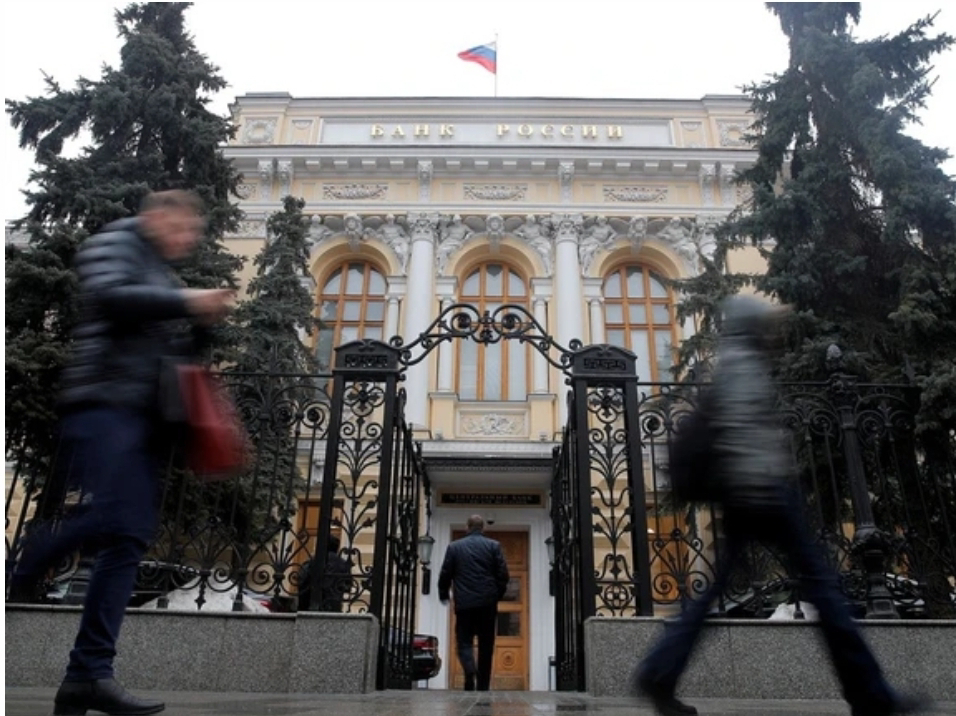MONTREAL -- Air Canada mengatakan eksekutif seniornya telah memilih untuk mengembalikan bonus 2020 mereka sebagai tanggapan atas "kekecewaan publik."
Perusahaan penerbangan mengatakan dalam siaran pers presiden dan CEO, serta wakil presiden eksekutif Air Canada, telah secara sukarela mengembalikan bonus mereka dan berbagi unit apresiasi.
Mantan presiden dan CEO Calin Rovinescu, yang pensiun pada Februari 2021, mengatakan dia juga akan menyumbangkan bagiannya ke Air Canada Foundation.
Pernyataan itu tidak termasuk manajer menengah, yang bonusnya menghasilkan lebih dari $8 juta dari program bonus $10 juta, di antara mereka yang secara sukarela memberikan bonus mereka.
Menteri Keuangan Chrystia Freeland mengisyaratkan ketidaksenangannya pada hari Rabu atas paket multi-juta dolar yang dibagikan kepada eksekutif maskapai ketika perusahaan menegosiasikan bailout federal, menyebut bonus itu "tidak pantas."
Maskapai Senin lalu mengungkapkan surat edaran proksi tahunannya kepada pemegang saham yang memberikan bonus kepada orang-orang yang disebut dokumen investor berperan penting dalam kelangsungan hidup maskapai selama setahun terakhir ketika perjalanan udara anjlok selama pandemi COVID-19.
"Tim kepemimpinan Air Canada sepenuhnya fokus pada pemulihan Air Canada dari pandemi COVID-19 dan persiapan untuk menyambut kembali kolega yang cuti dan pelanggan yang bepergian sesegera mungkin," kata pernyataan hari Minggu.
"Maskapai ini berharap dapat terus bekerja dengan semua pemangku kepentingan, terutama Pemerintah Kanada di banyak bidang, termasuk memulai kembali industri kami dengan aman."
Pada bulan April, maskapai dan pemerintah menyetujui paket pinjaman $ 5,9 miliar yang mencakup uang untuk membantu pengembalian uang tiket penumpang, tetapi juga membatasi kompensasi eksekutif sebesar $ 1 juta hingga 12 bulan setelah pinjaman dilunasi sepenuhnya.
Pemerintah juga membayar $500 juta untuk enam persen saham di maskapai terbesar di negara itu, yang menurut Freeland dilakukan untuk memastikan pembayar pajak bisa mendapatkan keuntungan begitu pendapatan Air Canada meningkat ketika perjalanan reguler dilanjutkan.
Pada awal tahun 2020, eksekutif senior dan 3.200 karyawan manajemen secara sukarela menyetujui pengurangan total sebesar $11,5 juta dalam gaji pokok mereka, dengan kompensasi melalui unit apresiasi saham yang memungkinkan karyawan memperoleh kembali sebagian dari gaji yang hilang jika harga saham naik lebih tinggi pada Desember 2022 dari Desember 2020, kata perusahaan.
Menteri Freeland dan Transportasi Omar Alghabra mengatakan orang Kanada "benar untuk mengharapkan perilaku perusahaan yang bertanggung jawab - terutama sehubungan dengan kompensasi eksekutif - dari perusahaan yang menerima dukungan keuangan pemerintah selama pandemi."
"Meskipun situasi ini dapat sepenuhnya dihindari oleh Air Canada, kami mengakui langkah ini ke arah yang benar oleh lima eksekutif teratas untuk membayar bonus 2020 dan berbagi unit apresiasi yang mereka terima," kata mereka dalam pernyataan bersama Minggu malam.
MONTREAL -- Air Canada says its senior executives have chosen to return their 2020 bonuses in response to "public disappointment."
The airline company says in a news release the president and CEO, as well as executive vice-presidents of Air Canada, have volunteered to return their bonuses and share appreciation units.
Former president and CEO Calin Rovinescu, who retired in February 2021, says he will also donate his share to the Air Canada Foundation.
The statement does not include middle managers, whose bonuses made up more than $8 million of the $10-million bonus program, among those who are volunteering their bonuses.
Finance Minister Chrystia Freeland signalled her displeasure Wednesday over the multi-million dollar packages handed out to the airline's executives as the company negotiated a federal bailout, calling the bonuses "inappropriate."
The airline last Monday disclosed its annual proxy circular to shareholders that gave the bonuses to people the investor document called instrumental in the airline's survival over the past year as air travel plunged during the COVID-19 pandemic.
"Air Canada's leadership team is completely focused on Air Canada's recovery from the COVID-19 pandemic and preparations to welcome back furloughed colleagues and travelling customers as soon as possible," Sunday's statement says.
"The airline looks forward to continuing to work with all stakeholders, notably the Government of Canada on many fronts, including the safe re-start of our industry."
In April, the airline and government agreed to a $5.9 billion loan package that includes money to help refund passenger tickets, but also capped executive compensation at $1 million until 12 months after the loan is fully repaid.
The government also paid $500 million for a six per cent stake in the country's biggest airline, which Freeland said was done to ensure taxpayers could benefit once Air Canada's revenue rises when regular travel resumes.
In early 2020, senior executives and 3,200 management employees voluntarily agreed to total reductions of $11.5 million in their base salaries, subject to compensation through share appreciation units that might allow employees to recover some of the forgone salary if the share price rises higher in December 2022 than December 2020, the company says.
Freeland and Transport Minister Omar Alghabra said Canadians "are right to expect responsible corporate behaviour -- particularly with respect to executive compensation -- from companies receiving government financial support during the pandemic."
"While this situation could have been entirely avoided by Air Canada, we acknowledge this step in the right direction by the top five executives to repay 2020 bonuses and share appreciation units they received," they said in a joint statement Sunday night.
Air Canada says senior executives to voluntarily return 2020 bonuses - BNN Bloomberg , more details : https://www.break.ma/news/27238868


Komentar